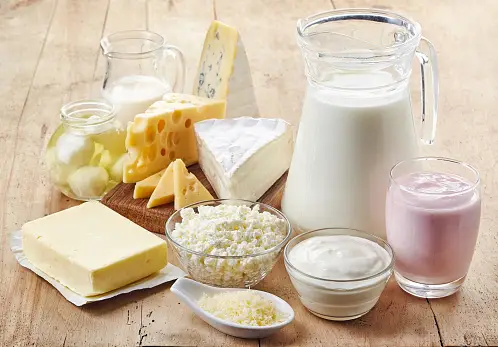Milk is a nutrient-rich liquid that offers numerous health benefits. Here are some key advantages of including milk in your diet:

1. Rich Source of Calcium
- Bone Health: Calcium is crucial for maintaining strong bones and teeth. Regular milk consumption can help prevent osteoporosis and other bone-related issues.
2. High in Protein
- Muscle Growth and Repair: Milk contains high-quality protein, which is essential for muscle development and repair. It is especially beneficial for athletes and those involved in physical activities.
3. Vitamin D
- Bone Strength: Many milk products are fortified with vitamin D, which enhances calcium absorption and promotes bone health.
- Immune Support: Vitamin D also plays a role in supporting the immune system.
4. Essential Vitamins and Minerals
- B Vitamins: Milk is a good source of B vitamins, including B12 and riboflavin, which are important for energy production and maintaining healthy nerve function.
- Potassium: Helps regulate blood pressure and maintain fluid balance.
5. Hydration
- Fluid Balance: Milk is about 87% water, making it a good option for hydration, especially for children and athletes.
6. Weight Management
- Satiety: The protein and fat content in milk can promote feelings of fullness, which may help with weight management by reducing overall calorie intake.
7. Dental Health
- Tooth Enamel: Calcium and phosphorus in milk contribute to the maintenance of strong tooth enamel and overall dental health.
8. Bone Development in Children
- Growth: Milk provides essential nutrients needed for the growth and development of children’s bones and teeth.
9. Digestive Health
- Probiotics: Fermented milk products like yogurt contain probiotics, which can promote a healthy gut microbiome and improve digestive health.
10. Convenient Nutrient Source
- Easy Consumption: Milk is a quick and convenient way to intake a variety of essential nutrients in one serving.
11. Skin Health
- Lactic Acid: The lactic acid in milk can help exfoliate the skin, and milk baths have been used historically to soothe and soften the skin.
Considerations:
While milk offers many health benefits, it is important to consider individual dietary needs and potential lactose intolerance or milk allergies. There are also various plant-based milk alternatives available for those who prefer or require non-dairy options.
By including milk as part of a balanced diet, you can take advantage of its many health benefits.

Milk, a nutrient-rich liquid produced by mammals, has been a staple in the human diet for thousands of years. It provides a wide array of essential nutrients, making it a valuable component of a balanced diet. Here’s a comprehensive overview of milk, its types, nutritional benefits, and considerations:
Types of Milk
1. Cow’s Milk
- Whole Milk: Contains around 3.5% fat. It is rich and creamy, often recommended for children and those needing higher calorie intake.
- Reduced-Fat Milk: Typically contains 2% fat. It strikes a balance between taste and lower fat content.
- Low-Fat Milk: Contains 1% fat. It is a lighter option with fewer calories.
- Skim Milk: Also known as fat-free milk, it has less than 0.5% fat.
2. Goat’s Milk
- Often easier to digest for some people due to its different protein structure and smaller fat globules compared to cow’s milk.
3. Plant-Based Milk Alternatives
- Soy Milk: High in protein, often fortified with calcium and vitamins.
- Almond Milk: Low in calories, often enriched with vitamins and minerals.
- Oat Milk: Higher in carbohydrates, creamy texture, often fortified.
- Coconut Milk: Rich and creamy, with a distinct flavor and lower protein content.
Nutritional Benefits
1. Calcium
- Essential for building and maintaining strong bones and teeth.
- Helps with blood clotting, muscle contraction, and nerve function.
2. Protein
- High-quality protein source, providing all essential amino acids.
- Supports muscle growth and repair.
3. Vitamins
- Vitamin D: Important for calcium absorption and bone health. Many milk products are fortified with vitamin D.
- Vitamin B12: Crucial for red blood cell formation and neurological function.
- Riboflavin (B2): Important for energy production and skin health.
4. Minerals
- Potassium: Helps maintain healthy blood pressure.
- Phosphorus: Works with calcium to build bones and teeth.
5. Other Nutrients
- Lactose: A natural sugar that provides energy. Some people are lactose intolerant and may need lactose-free alternatives.
Health Benefits
Bone Health
- High calcium and vitamin D content support strong bones and help prevent osteoporosis.
Muscle Development
- High-quality protein aids in muscle repair and growth, beneficial for athletes and active individuals.
Hydration
- Milk is about 87% water, making it a good choice for hydration.
Weight Management
- Protein and fat content can help promote satiety and reduce overall calorie intake.
Dental Health
- Calcium and phosphorus contribute to strong tooth enamel and overall dental health.
Considerations
Lactose Intolerance
- Some people lack the enzyme lactase needed to digest lactose, leading to gastrointestinal discomfort. Lactose-free milk or plant-based alternatives can be suitable options.
Milk Allergies
- Allergies to milk proteins (casein and whey) can cause severe reactions. In such cases, plant-based alternatives are necessary.
Saturated Fat Content
- Whole milk contains higher levels of saturated fat, which should be consumed in moderation as part of a balanced diet.
Environmental and Ethical Considerations
Sustainability
- The production of cow’s milk has a significant environmental impact, including greenhouse gas emissions and water use.
Animal Welfare
- Ethical considerations regarding the treatment of dairy cows have led some consumers to choose plant-based alternatives.
Conclusion
Milk is a versatile and nutrient-dense beverage that can play a vital role in a healthy diet. It offers numerous health benefits, from supporting bone health to aiding in muscle development. However, individual dietary needs and preferences, such as lactose intolerance or ethical considerations, may influence the choice of milk or milk alternatives. By understanding its benefits and options, consumers can make informed choices that best suit their nutritional and ethical values.

Milk is a versatile ingredient that can be consumed in various forms and used in numerous recipes. Here are some ways to enjoy milk and a selection of recipes that incorporate milk:
Ways to Consume Milk
Plain Drinking
- Chilled or Warm: Enjoy a glass of milk straight from the fridge or warmed up, with or without sweeteners like honey or flavored syrups.
With Cereal or Oatmeal
- Breakfast: Pour milk over cereal, granola, or oatmeal for a nutritious start to the day.
In Beverages
- Tea and Coffee: Add milk to tea or coffee for a creamy texture.
- Smoothies: Blend milk with fruits, vegetables, and protein powders to make a nutritious smoothie.
As a Base for Shakes and Lattes
- Milkshakes: Blend milk with ice cream and flavors like chocolate, vanilla, or fruits.
- Lattes: Steam milk and combine with espresso for a classic latte.
Cooking and Baking
- Soups and Sauces: Use milk to create creamy soups and sauces.
- Baking: Incorporate milk into baked goods like cakes, muffins, and bread.
Recipes Using Milk
1. Classic Rice Pudding
Ingredients:
- 1 cup short-grain rice
- 4 cups milk
- 1/2 cup sugar
- 1 teaspoon vanilla extract
- 1/2 teaspoon cinnamon (optional)
- Raisins or other dried fruits (optional)
Instructions:
- In a large saucepan, combine rice and milk.
- Cook over medium heat, stirring frequently, until the mixture comes to a boil.
- Reduce heat to low and simmer, stirring occasionally, for about 25-30 minutes, or until the rice is tender and the pudding has thickened.
- Stir in sugar and vanilla extract (and cinnamon or dried fruits if using).
- Serve warm or chilled.
2. Creamy Tomato Soup
Ingredients:
- 1 tablespoon butter
- 1 onion, chopped
- 2 cloves garlic, minced
- 4 cups tomatoes, chopped (or 2 cans of crushed tomatoes)
- 2 cups chicken or vegetable broth
- 1 cup milk
- Salt and pepper to taste
- Fresh basil leaves for garnish (optional)
Instructions:
- In a large pot, melt butter over medium heat.
- Add onion and garlic, and cook until soft and fragrant.
- Add tomatoes and broth, and bring to a boil.
- Reduce heat and simmer for about 20 minutes.
- Use an immersion blender to puree the soup until smooth (or transfer to a blender in batches).
- Stir in milk and heat through, but do not boil.
- Season with salt and pepper, and garnish with fresh basil leaves.
3. Bechamel Sauce (White Sauce)
Ingredients:
- 2 tablespoons butter
- 2 tablespoons flour
- 2 cups milk
- Salt and pepper to taste
- Nutmeg (optional)
Instructions:
- In a saucepan, melt butter over medium heat.
- Stir in flour to form a roux, and cook for 1-2 minutes, stirring constantly.
- Gradually add milk, whisking continuously to prevent lumps.
- Bring to a boil, then reduce heat and simmer until thickened, about 5 minutes.
- Season with salt, pepper, and a pinch of nutmeg if desired.
- Use as a base for macaroni and cheese, lasagna, or other dishes.
4. Pancakes
Ingredients:
- 1 1/2 cups all-purpose flour
- 3 1/2 teaspoons baking powder
- 1 teaspoon salt
- 1 tablespoon sugar
- 1 1/4 cups milk
- 1 egg
- 3 tablespoons melted butter
Instructions:
- In a large bowl, sift together flour, baking powder, salt, and sugar.
- Make a well in the center and pour in the milk, egg, and melted butter. Mix until smooth.
- Heat a lightly oiled griddle or frying pan over medium-high heat.
- Pour or scoop the batter onto the griddle, using approximately 1/4 cup for each pancake.
- Brown on both sides and serve hot with syrup, fruit, or other toppings.
5. Homemade Yogurt
Ingredients:
- 4 cups milk
- 2 tablespoons plain yogurt with live cultures (as a starter)
Instructions:
- Heat milk in a saucepan until it reaches 180°F (82°C), then cool it down to 110°F (43°C).
- Stir in the plain yogurt.
- Pour the mixture into a clean container and cover.
- Keep the container warm (around 110°F) for 6-12 hours, or until the yogurt has set.
- Refrigerate for a few hours before serving.
These are just a few examples of how milk can be used in various recipes. Whether you enjoy it on its own or as an ingredient in a dish, milk's versatility and nutritional benefits make it a valuable addition to your diet.

Milk is the base for a wide variety of dairy products, each with its own unique flavor, texture, and nutritional benefits. Here are some common dairy products made from milk:
1. Butter
- Made by churning cream, separating the butterfat from the buttermilk.
- Used in cooking, baking, and as a spread.
2. Cheese
- Produced by curdling milk using rennet or an acid, then aging the curds.
- Varieties include cheddar, mozzarella, brie, gouda, blue cheese, and many more.
3. Yogurt
- Created by fermenting milk with bacterial cultures.
- Available in various types such as Greek yogurt, regular yogurt, and flavored yogurt.
4. Cream
- Separated from the top layer of milk before homogenization.
- Types include heavy cream, light cream, whipping cream, and sour cream.
5. Ice Cream
- Made by churning and freezing a mixture of milk, cream, sugar, and flavorings.
- Variants include gelato, sorbet, and frozen yogurt.
6. Kefir
- A fermented milk drink similar to yogurt but with a thinner consistency.
- Contains probiotics that promote digestive health.
7. Buttermilk
- Traditionally the liquid left after churning butter, but now usually cultured milk.
- Used in baking for its tangy flavor and ability to tenderize baked goods.
8. Custard and Pudding
- Desserts made with milk, sugar, and eggs or starch for thickening.
- Variants include crème brûlée, flan, and pastry cream.
9. Evaporated Milk
- Milk that has been concentrated by removing about 60% of the water content.
- Used in cooking and baking for its rich flavor and longer shelf life.
10. Condensed Milk
- Sweetened version of evaporated milk with sugar added.
- Commonly used in desserts and baking.
11. Milk Powder
- Dehydrated milk used for long-term storage and in recipes where fresh milk is impractical.
- Available as whole milk powder and skim milk powder.
12. Ghee
- Clarified butter with the milk solids removed, resulting in a product with a high smoke point and rich, nutty flavor.
- Common in Indian cuisine.
13. Ricotta
- A fresh cheese made from whey leftover from other cheese production.
- Often used in Italian dishes like lasagna and cannoli.
14. Cottage Cheese
- A fresh cheese made from curds, with a mild flavor and slightly grainy texture.
- Can be eaten plain or used in recipes.
15. Sour Cream
- Cream that has been fermented with lactic acid bacteria.
- Used as a condiment and in baking.
These dairy products demonstrate the versatility of milk and its importance in various culinary traditions around the world. Each product offers unique flavors, textures, and nutritional benefits, making them valuable additions to a balanced diet.

Yes, Milk is considered to be a food. It is a highly nutritious substance that provides a range of essential nutrients, making it a valuable part of the diet. Here are some reasons why milk is classified as food:
Nutritional Content
Macronutrients
- Proteins: Milk contains high-quality proteins, which include all essential amino acids necessary for growth and repair.
- Fats: It provides essential fatty acids and energy. The fat content varies depending on the type of milk (whole, reduced-fat, low-fat, or skim).
- Carbohydrates: Lactose, the natural sugar in milk, provides energy.
Micronutrients
- Vitamins: Milk is rich in vitamins such as vitamin D (often fortified), B12, riboflavin (B2), and vitamin A.
- Minerals: It is an excellent source of calcium, phosphorus, and potassium.
Health Benefits
Bone Health
- The high calcium and vitamin D content in milk supports bone development and maintenance, helping to prevent osteoporosis and other bone-related issues.
Muscle Growth and Repair
- The proteins in milk are crucial for muscle growth and repair, making it an important food for athletes and those involved in physical activities.
Hydration
- Milk is approximately 87% water, contributing to hydration while providing essential nutrients.
Weight Management
- The protein and fat in milk can promote feelings of fullness, potentially helping with weight management by reducing overall calorie intake.
Digestive Health
- Fermented milk products like yogurt contain probiotics that promote a healthy gut microbiome and improve digestive health.
Versatility in Diet
Milk can be consumed in various forms and used in numerous recipes, making it a versatile food:
- Beverages: Consumed plain, in tea or coffee, or as a base for smoothies and milkshakes.
- Cooking and Baking: Used in soups, sauces, baked goods, and desserts.
- Dairy Products: Processed into butter, cheese, yogurt, cream, and more.
Considerations
While milk is a nutritious food, it is important to consider individual dietary needs and preferences. Some people may be lactose intolerant or allergic to milk proteins, and others may choose non-dairy alternatives for ethical, environmental, or health reasons.
Conclusion
Milk is undeniably a food, rich in essential nutrients and beneficial for overall health. Its versatility and nutritional content make it a valuable part of many diets around the world.

The timing of drinking milk can depend on individual health goals, dietary preferences, and lifestyle factors. Here are some common recommendations for when to drink milk and the potential benefits associated with each:
1. Morning
- Energy Boost: Drinking milk in the morning can provide a good source of protein, calcium, and other essential nutrients to start the day.
- With Breakfast: It pairs well with cereals, oatmeal, or as part of a smoothie, offering a balanced meal to kickstart the day.
2. Before or After Exercise
- Pre-Workout: A glass of milk before exercising can provide energy and essential nutrients to fuel the workout.
- Post-Workout: Drinking milk after exercise can aid in muscle recovery and replenishment of glycogen stores due to its protein and carbohydrate content.
3. Evening
- Relaxation and Sleep: A warm glass of milk in the evening can promote relaxation and help with sleep. The amino acid tryptophan found in milk can have a calming effect and potentially aid in better sleep quality.
4. Before Bed
- Nighttime Nutrition: Drinking milk before bed can provide a slow-release source of protein throughout the night, which can be beneficial for muscle repair and growth.
- Satiety: A glass of milk before bed can help curb late-night hunger, preventing unnecessary snacking.
5. With Meals
- Improved Nutrient Absorption: Drinking milk with meals can enhance the absorption of certain nutrients, like calcium and vitamin D.
- Balanced Diet: Including milk as part of a meal ensures a balanced intake of macronutrients and essential vitamins and minerals.
6. As a Snack
- Healthy Snack Option: A glass of milk can be a nutritious snack, providing energy and essential nutrients between meals.
Considerations
- Individual Health Needs: People with lactose intolerance or milk allergies should choose lactose-free milk or dairy alternatives.
- Caloric Intake: Be mindful of the calorie content, especially if you are monitoring your calorie intake for weight management.
- Nutritional Balance: Ensure that milk consumption fits into a balanced diet and does not replace other essential nutrients from a variety of food sources.
Conclusion
There is no strict rule for the best time to drink milk, as it largely depends on individual preferences and dietary goals. Whether you choose to drink it in the morning, after a workout, in the evening, or before bed, milk can be a nutritious addition to your daily diet when consumed in moderation.

India is one of the largest producers of milk in the world, and it has a number of prominent dairy companies. Here are some of the leading milk-producing companies in India:
1. Amul (Gujarat Cooperative Milk Marketing Federation Ltd.)
- Headquarters: Anand, Gujarat
- Overview: Amul is one of the largest and most well-known dairy brands in India. It offers a wide range of dairy products, including milk, butter, cheese, ice cream, and more.
- Website: Amul
2. Mother Dairy
- Headquarters: Noida, Uttar Pradesh
- Overview: Established under the National Dairy Development Board (NDDB), Mother Dairy is a significant player in the Indian dairy industry, providing milk, ice cream, butter, and other dairy products.
- Website: Mother Dairy
3. Parag Milk Foods
- Headquarters: Mumbai, Maharashtra
- Overview: Known for its premium products under brands like Gowardhan, Go, and Pride of Cows, Parag Milk Foods offers a variety of dairy products including milk, cheese, yogurt, and ghee.
- Website: Parag Milk Foods
4. Dudhsagar Dairy (Mehsana District Cooperative Milk Producers' Union Ltd.)
- Headquarters: Mehsana, Gujarat
- Overview: Part of the Gujarat Cooperative Milk Marketing Federation, Dudhsagar Dairy is a key milk producer, offering products like milk, butter, ghee, and powder.
- Website: Dudhsagar Dairy
5. Nandini (Karnataka Milk Federation)
- Headquarters: Bangalore, Karnataka
- Overview: Nandini is a major dairy brand in Karnataka, offering a wide range of products including milk, butter, ghee, cheese, and sweets.
- Website: Nandini
6. Aavin (Tamil Nadu Cooperative Milk Producers' Federation Limited)
- Headquarters: Chennai, Tamil Nadu
- Overview: Aavin is a leading dairy brand in Tamil Nadu, known for its fresh milk, butter, ghee, ice cream, and other dairy products.
- Website: Aavin
7. Heritage Foods
- Headquarters: Hyderabad, Telangana
- Overview: Heritage Foods produces and markets milk and dairy products, including curd, buttermilk, ice cream, paneer, and more.
- Website: Heritage Foods
8. Kwality Dairy
- Headquarters: New Delhi
- Overview: Kwality Dairy offers a variety of dairy products such as milk, curd, paneer, and butter.
- Website: Kwality Dairy
9. Hatsun Agro Product Ltd.
- Headquarters: Chennai, Tamil Nadu
- Overview: Known for brands like Arokya, Hatsun, and Arun Ice Creams, Hatsun Agro produces a wide range of dairy products.
- Website: Hatsun Agro
10. Vijaya Dairy (Andhra Pradesh Dairy Development Cooperative Federation Ltd.)
- Headquarters: Hyderabad, Telangana
- Overview: Vijaya Dairy offers products such as milk, butter, ghee, and flavored milk.
- Website: Vijaya Dairy
These companies are known for their quality dairy products and significant contributions to India's dairy industry.










Post a Comment